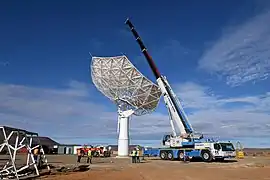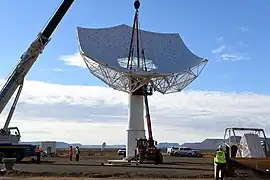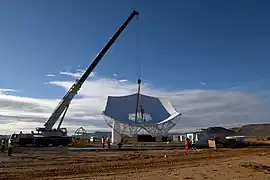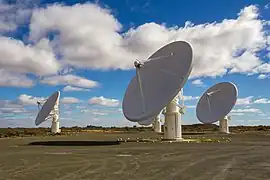| Meerkat National Park | |
|---|---|
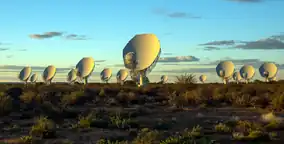 | |
| Location | Karoo Hoogland and Kareeberg municipalities, Northern Cape, South Africa |
| Nearest city | Carnarvon |
| Coordinates | 30°41′29.2″S 21°23′24.0″E / 30.691444°S 21.390000°E |
| Area | 135,245 hectares (334,200 acres) |
| Designated | 27 March 2020 |
| Administrator | South African National Parks |
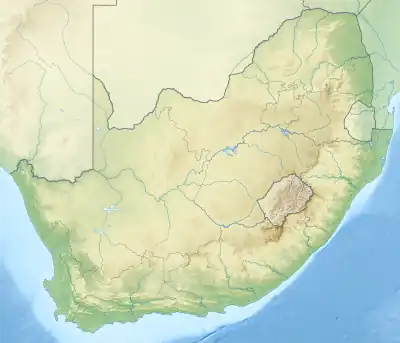 Meerkat National Park (South Africa) | |
Meerkat National Park is a large National Park in the Northern Cape, South Africa, that encompasses the Square Kilometre Array's MeerKAT, PAPER and HERA telescopes.
To ensure long term viability of the Karoo site for the Square Kilometre Array project and other radio astronomy instruments, the Parliament of South Africa passed the Astronomy Geographic Advantage Act, 2007. The act gives the Minister of Science and Technology the authority to protect areas, through regulations, that are of strategic national importance for astronomy and related scientific endeavours.[1][2][3][4] The park does not allow visitors.[5]
History
The National Research Foundation purchased privately owned rangeland, removed livestock from the area and placed it under the protection of SANParks.[6] In 2020, this park was declared in partnership with the National Research Foundation and the Square Kilometre Array project. It added 3.4% to South Africa's national parks.
Objectives
In addition to hosting the Square Kilometre Array and other astronomical research projects, the National Research Foundation's South African Environmental Observation Network will seek to study large-scale management and long-term environmental research of the area, and the impact of climate change on the local ecosystem.[6]
One of the objectives in creating the park was to increase the protection range of three unprotected ecoregions, including the Nama Karoo ecoregion from 1.5% to 2%; and in doing so, conserve the vulnerable quiver tree forests and other threatened species in the region.[5]
Ecology
After declaring the park, a number of steps were taken to rehabilitate the land, including the removal of livestock, fences and copses of alien mesquite, this saw an increase in wildlife numbers.[6] The park has a healthy population of quiver trees.[5]
Vegetation types
The park comprises five types of vegetation, namely Bushmanland Basin Shrubland, an aquatic type zone called Bushmanland Vloere, Northern Upper Karoo, Upper Karoo Hardeveld, and Western Upper Karoo vegetation.[6]
223 plant species were documented in the park.[7]
Biodiversity
Amphibians
Birds
There are estimated between 215 and 264 bird species, with 25 near endemic and two endemic species, the red lark and Sclater's lark.[7]
Invertebrates
Termites are thought to be found within the park with the existence of heuweltjies.
Mammals
There have been 29 species of mammal documented in the park, including three bat species:[7]
Reptiles
Gallery
See also
References
- ↑ "DECLARATION OF CERTAIN PROPERTIES SITUATED IN THE NORTHERN CAPE PROVINCE THE: MEER KATNATIONAL PARK" (PDF).
- ↑ "NATIONAL PARK GAZETTED NAME: MEERKAT NATIONAL PARK" (PDF).
- ↑ "Protected Planet | Meerkat National Park". Protected Planet. Retrieved 22 May 2022.
- ↑ "Astronomy Geographic Advantage Act". South African Radio Astronomy Observatory.
- 1 2 3 "Address by the Minister of Environment, Forestry and Fisheries Ms Barbara Creecy, MP, at the Launch of SA National Parks Week".
- 1 2 3 4 van der Merwe, Helga; Milton, Suzanne J.; Dean, W. Richard J.; O'Connor, Tim G.; Henschel, Joh R. (29 November 2021). "Developing an environmental research platform in the Karoo at the Square Kilometre Array". South African Journal of Science. 117 (11/12). doi:10.17159/sajs.2021/10511. ISSN 1996-7489.
- 1 2 3 "Meerkat National Park - Park Management Plan" (PDF). 2022. Archived from the original (PDF) on 1 December 2023.
